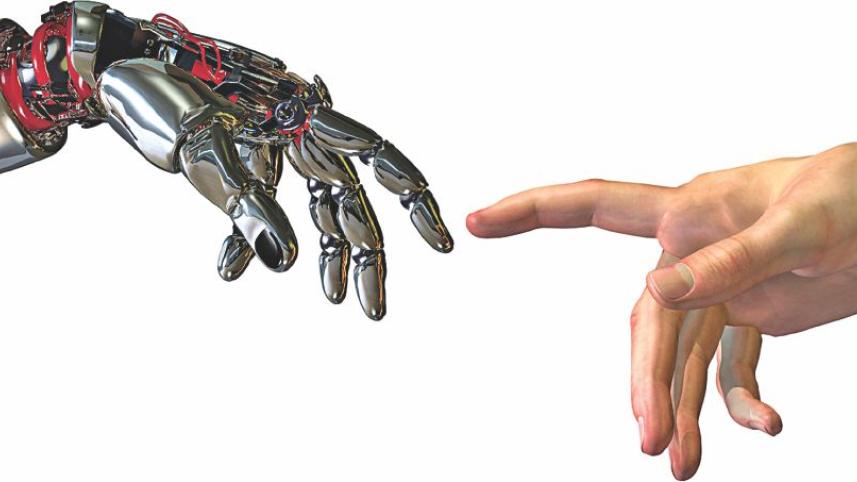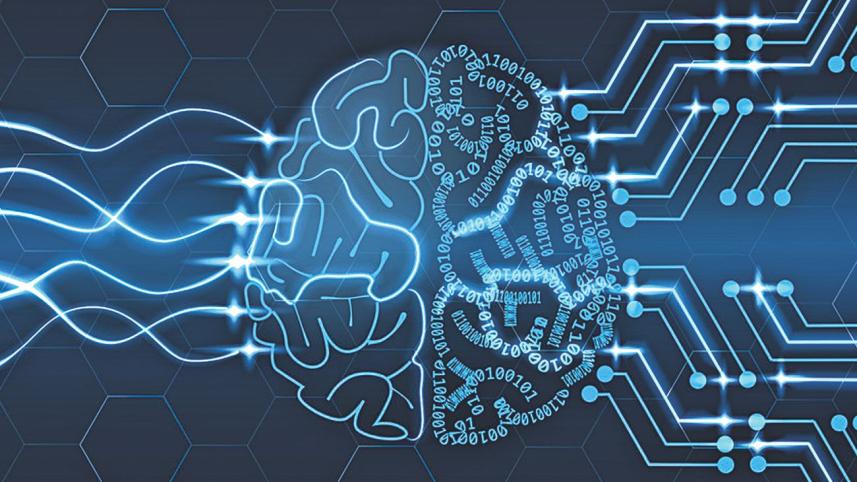CRAFTING INTELLIGENCE

Humans, from the time it took its first primitive steps towards civilization, have relied on tools – to survive, evolve, make sense of the world around them and to shape that world to their needs. From the first rock hurled at a wild animal in self-defense, to the farmer's sickle, to the hundreds of thousands of lines of code dictating logic inside a robot, humans have used tools to overcome almost all of their shortcomings. Our tool building ability has even slowed down the process of natural selection – instead of letting our genes modify and adapt to surviving in arctic conditions like polar bears over thousands of generations, we skin animals using our tools and wrap ourselves in fur as protection from the cold.
All of this has a deeper meaning when contemplating the future of our species. In terms of the way humans worked, the Hunter-Gatherer age lasted tens of thousands of years, the Agricultural Age lasted thousands of years, the Industrial Age lasted just a little over a century and the current Information Age is expected to last only a few decades. What comes next? According to Maurice Conti, futurist and Director of Applied Research & Innovation at Autodesk, we are at the cusp of what people are calling the "Augmented Age".
The Augmented Age
According to the people at the forefront of this revolutionary new approach to the way humans use or will use tools, the technology of the future is expected to naturally augment human learning, designing and building in a way that surpasses what humans could do alone or with tools that only do what is asked of them. The distinction between augmenting technology and the tech that we are used to seeing all around us is a fine one, but quite important. While the tools available for mass usage at the moment are programmed to work within parameters set by the designer and have trouble functioning outside those parameters, the purpose of augmenting technology is to fill the gaps that normal human beings just wouldn't be able to plug. In essence, the augmented age will be one of machines which are open-ended, machines which go beyond normal programming to operate in the unknown, both to itself and its human masters. Machines, which possess Artificial Intelligence.
If all of this is starting to sound like the naïve day dreams of a sci-fi obsessed teen, it's because we're at the foothills of a mountain that we can't even comprehend the height of, let alone know how to climb it. Machine learning and neural networks have opened up pathways which we as a species are only just beginning to explore, and yet we're seeing examples of the potential of machines imbued with the basic mechanics of identifying the world around them and learning from it.

Google DeepMind and AlphaGo
Google's DeepMind project, initially started by AI researcher, neuroscientist and developer David Hassabis in 2010 and acquired by Google in 2014, has created an AI called AlphaGo. In May 2017, AlphaGo played the ancient Chinese game of Go against the current world champion, Ke Jie, and defeated him across 3 games. Now, machines beating human players at games like Chess are quite common – what makes AlphaGo's achievement significant is that, unlike Chess, Go has more possible moves in the game than there are atoms in the universe, making it impossible for a programmer to code in all the different variations and game moves into the machine. To beat a human master at the game, the machine must learn how to play the game and "think" about possible moves and their outcomes when playing, much like a human would.
General Purpose AI
AlphaGo might just be a machine that is great at learning how to play a game, but the significance of how well it has learned a game has profound impact. To make it think like a human, the developers put it through a rigorous course of deep learning – AlphaGo's training regimen involved playing games against older versions of itself over and over, until it "learned" how to iron out its mistakes and minimise the frequency of those mistakes. It's also important to mention that AlphaGo, unlike most AI being developed at the moment, is General Purpose AI – meaning it can learn from and discern patterns in almost anything. If you give it examples of Go players using a particular strategy to outwit an opponent, AlphaGo will learn it and recall it when playing. If you give it traffic camera footage, it'll accurately predict when an intersection will be busy at a certain time of day. Give it a live feed from 360 degree cameras and engineer a fast enough reaction time, and a general purpose AI can also be in the driving seat of your future autonomous vehicle.
General purpose AI, if it continues to gain ground at the same pace, will revolutionise the way we perceive and interact with our world. Everything from financial modelling to urban planning to industrial design is set to change with the increased involvement of AI and machine learning systems. Neural networks, using a system of artificial neurons which receive signals and process them to "see" or "hear" and translate them so that the machine interface can understand them, are changing the way machines interact with their masters. While machine learning is becoming more common, true general purpose Artificial Intelligence is still farther away. Even though we're seeing more research labs picking up AI and playing around with the tech with open source resources available in some cases, there needs to be a greater drive towards developing tools we can actually use.
Playing God
As with most new technology, there is an inherent distrust involved in accepting it as a part of normal life. Douglas Adams had a rule about how we react to technology - "Anything that is in the world when you're born is normal and ordinary and is just a natural part of the way the world works. Anything that's invented between when you're fifteen and thirty-five is new and exciting and revolutionary and you can probably get a career in it. Anything invented after you're thirty-five is against the natural order of things." As early as 1863, Samuel Butler suggested that the Darwinian evolution may be applicable to machines, and that they might one day become conscious and supplant humanity. While some people's paranoia of intelligent robots are slightly juvenile, there are very real fears elsewhere, when it comes to the ethics involved – let's just say an AI controlled military drone wouldn't think twice about pulling the trigger and firing rockets at civilians. Considering it's a nascent industry, regulations and involvement of watchdogs is much needed, not to mention using a strict code of morals when developing AI.
By creating machines in our image, humanity is getting closer and closer to actually creating intelligence. Can an intelligent machine be intelligent "life", though? Since an intelligent machine doesn't have consciousness per se, they're still quite distinct from humans with a conscience and a moral hierarchy. Playing god and creating intelligence sounds like science fiction, but we've already taken the first few steps towards a new age for humanity. Where that leads is still in the unknown, although one thing is for certain – we live in very interesting times.




 For all latest news, follow The Daily Star's Google News channel.
For all latest news, follow The Daily Star's Google News channel.
Comments